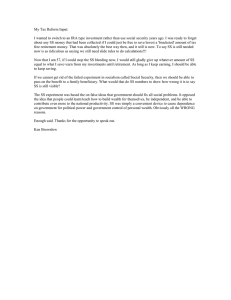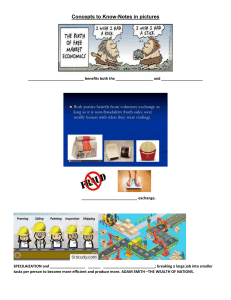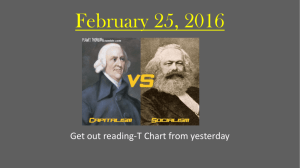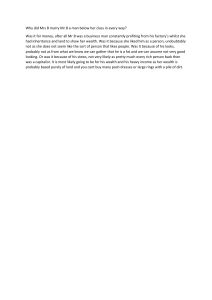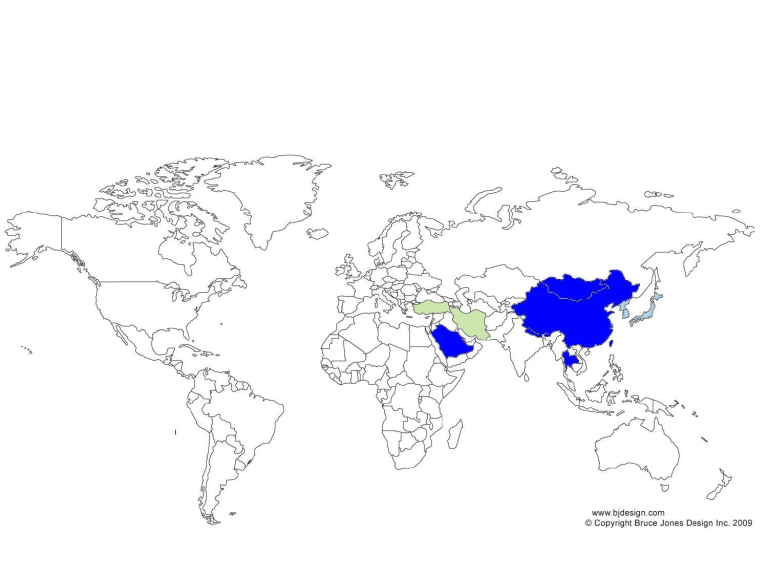
It is not from the benevolence of the butcher, the brewer or baker that we expect our dinner, but from their regard to their self-interest. -Adam Smith NEEDS and WANTS Politics How is economics different than politics? “Politics is war by other means.” • Politics is used to decide who gets what, when, and how much in any socio-economic system. • Other systems too! What is the Economy? The process or system by which goods and services are produced, sold, and bought in a country or region. Or is it… The large set of inter-related production, consumption, and exchange activities that aid in determining how scarce resources are allocated. The production, consumption, and distribution of goods and services are used to fulfill the needs of those living and operating within the economy, which is also referred to as an economic system. Or is it… A social domain that emphasize the practices, discourses, and material expressions associated with the production, use, and management of scarce resources. Or is it… A system of organizations and institutions that either facilitate or play a role in the production and distribution of goods and services in a society. But regardless of the economy How a society structures its economic system is largely a political and social issue. The political and legal structure of a society will govern how wealth can be accumulated, how wealth and resources are distributed, and the manner of competition permitted between different participants in the economy. Markets An actual or nominal place where forces of demand and supply operate, and where buyers and sellers interact (directly or through intermediaries) to trade goods, services, or contracts or instruments, for money or barter. Markets Markets include mechanisms for: (1) determining price of the traded item, (2) communicating the price information, (3) facilitating deals and transactions, (4) affecting distribution. The market for a particular item is made up of existing and potential customers who need it and have the ability and willingness to pay for it. Capitalism The private ownership and control of the means of production, and their operation for profit. Central characteristics include: capital accumulation competitive markets a price system determined by supply and demand private property and property rights recognition voluntary exchange wage labor Communism Vs. Socialism In both communism and socialism, the people own the factors of economic production. The main difference is that under communism, most property and economic resources are owned and controlled by the state (rather than individual citizens). Under socialism, all citizens share equally in economic resources as allocated by a democratically-elected government. Norway, Sweden, and Denmark All employ similar predominantly socialist systems. The democratically chosen governments of all three countries provide free health care, education, and lifetime retirement income. As a result, however, their citizens pay some of the world’s highest taxes. All three countries also have highly successful capitalist sectors. With most of their needs provided by their governments, the people see little need to accumulate wealth. As a result, about 10% of the people hold more than 65% of each nation’s wealth. (In the US 10% owns 90%) CAPITAL 1. Wealth in the form of money or assets, taken as a sign of the financial strength of an individual, organization, or nation, and assumed to be available for development or investment. 2. Accounting: Money invested in a business to generate income. 3. Economics: Factors of production that are used to create goods or services and are not themselves in the process. social credit/debt/obligation The preservation of reputation in a society where credit was the key to market participation, and thus survival, wealth, etc. In this case, the word credit means: the social communication and circulating judgement about the value of other members of a community
